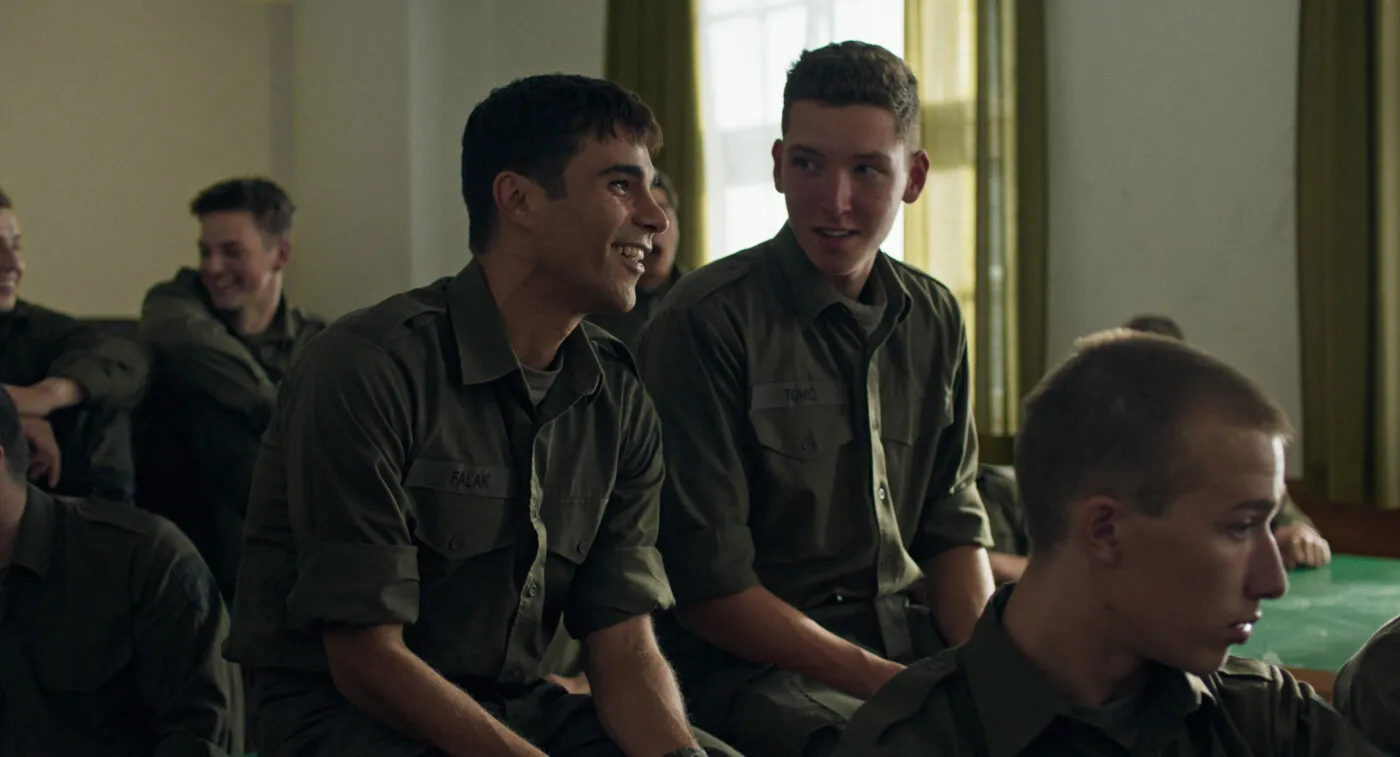𝐄𝐢𝐬𝐦𝐚𝐲𝐞𝐫 (𝟐𝟎𝟐𝟐)| 𝐄𝐢𝐬𝐦𝐚𝐲𝐞𝐫, 𝐃𝐞𝐯𝐢𝐜, 𝐊𝐚𝐫𝐥
May 20, 2025
Eismayer (2022): A Quietly Explosive Story of Repression, Identity, and Unexpected Love in Uniform
There are films that roar, and there are films that whisper — but shake you just the same. Eismayer (2022) is one of the latter. Subtle, restrained, and simmering with internal tension, this Austrian drama defies expectation at every turn. What begins as a harsh, testosterone-driven military tale gradually transforms into a piercing exploration of masculinity, suppressed desire, and the courage it takes to be seen — truly seen — in a world built on silence and command.
Directed by David Wagner with remarkable nuance, Eismayer unspools a real-life-inspired story with the kind of emotional precision and visual restraint that lets you feel every glance, every unspoken word, every moment of resistance and surrender. It’s not just a love story. It’s a study of identity in conflict with duty — and of the possibility for tenderness to emerge in the least likely places.

Plot Summary
Sergeant Major Charles Eismayer is a legend within the Austrian military. Known for his brutal discipline, cold demeanor, and unwavering commitment to the rules, he commands fear and respect in equal measure. To his recruits, he is the embodiment of masculine authority. What they don’t know — and what Eismayer himself refuses to fully acknowledge — is the storm he carries inside.
His tightly controlled world begins to unravel when he meets Mario Falak, a bold, openly gay young soldier whose quiet self-assurance and inner strength challenge everything Eismayer thought he knew about himself. The collision between their worlds is not dramatic in the traditional sense — but emotionally, it’s volcanic.
As the film unfolds, we witness Eismayer’s rigid shell begin to crack. The battlefield is no longer just external — it’s internal. His growing connection to Falak forces him to confront his long-buried desires, his fear, and the life he’s built on denial. The power dynamics shift, subtly and authentically, until Eismayer is no longer the man giving orders — but the one trying to find the courage to follow his heart.

Artistic Analysis
Visually, Eismayer is a masterclass in restraint. The cinematography is crisp, disciplined, almost militaristic in its framing — until intimacy creeps in. Then, the edges soften. The camera lingers longer. The light changes. The film is constantly balancing opposites: the cold geometry of military barracks against the quiet vulnerability of two men sharing space without touching.
Director David Wagner doesn’t waste a single frame. Every shot is loaded with emotional subtext. The silence between characters speaks louder than dialogue. The physical proximity in cramped bunks and drill formations becomes a canvas for repressed desire and unbearable tension.
The sound design is spare, letting the echo of boots on concrete, the breath before a command, the quiet of a shared cigarette, fill the space with meaning. There is music, but it’s used delicately — not to tell us how to feel, but to underscore the gravity of what’s felt beneath the surface.

Performances
Gerhard Liebmann delivers an unforgettable performance as Eismayer. His transformation is not abrupt — it’s a slow uncoiling of a man who has armored himself against his own truth. Liebmann brings both steely intensity and aching fragility to the role. He can command an entire scene with a twitch of his jaw or a tightening of his voice.
Luka Dimić as Mario Falak is luminous. He doesn’t play Falak as a symbol or a challenge, but as a fully realized human being: confident, quiet, strong in his own identity without needing to prove it. Dimić’s presence is magnetic — gentle but unshakable — and it’s easy to see why Eismayer’s world begins to tilt in his orbit.
Together, their chemistry is electric without needing to be overt. It builds not through passion but through trust, through tension, through the painful, beautiful vulnerability of two men learning how to see and be seen.

Emotional Impact
The emotional power of Eismayer lies in its honesty. It doesn’t dramatize or sensationalize. It allows space for discomfort, for fear, for denial. And that’s precisely why it feels so devastatingly real.
Watching Eismayer wrestle with his identity is like watching a dam strain under pressure. You know it will break. You don’t know when. And when it does, it isn’t cathartic — it’s tender, it’s terrifying, and it’s utterly human.
The film captures the loneliness of secrecy, the quiet violence of pretending, and the radical intimacy of being accepted — not despite who you are, but because of it. It’s not just a story of coming out. It’s a story of coming home, within oneself.
Tone and Rhythm
The tone of Eismayer is calm, steady, and quietly intense. There are no outbursts, no operatic confrontations. Instead, the film unfolds with the rhythm of a slow march — deliberate, patient, and focused. This pacing allows the emotional stakes to build organically, letting the audience live inside Eismayer’s emotional landscape as it shifts.
The film never strays into melodrama. Its power is in its silence. In long-held stares. In the aching pause between two words. In the decision to walk toward someone when everything in you wants to retreat.

Final Thoughts
Eismayer (2022) is a rare film — one that combines emotional depth with visual elegance, and intimate storytelling with universal themes. It’s about the men we pretend to be, the lives we lock away inside ourselves, and the quiet revolutions that happen when love dares to knock on the door.
It doesn’t offer easy answers or sweeping declarations. Instead, it offers truth — tender, conflicted, and hard-earned. And in doing so, it becomes not just a story about a soldier. It becomes a story about all of us who’ve ever feared being known, and who’ve hoped, in the silence of our hearts, to be loved anyway.
Eismayer doesn’t just challenge the idea of masculinity. It redefines it — through love, through vulnerability, and through the quiet bravery of choosing to live honestly, even when the world doesn’t make it easy.

